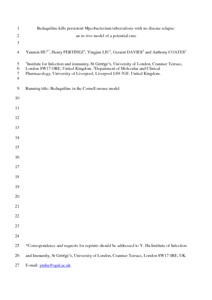Hu, Y; Pertinez, H; Liu, Y; Davies, G; Coates, A
(2019)
Bedaquiline kills persistent Mycobacterium tuberculosis with no disease relapse: an in vivo model of a potential cure.
J Antimicrob Chemother, 74 (6).
pp. 1627-1633.
ISSN 1460-2091
https://doi.org/10.1093/jac/dkz052
SGUL Authors: Coates, Anthony Robert Milnes Hu, Yanmin
![[img]](https://openaccess.sgul.ac.uk/110714/6.hassmallThumbnailVersion/Bedaquiline%20JAC%20final%20submit%20version.pdf)  Preview |
|
PDF
Accepted Version
Available under License ["licenses_description_publisher" not defined].
Download (731kB)
| Preview
|
Abstract
OBJECTIVES: Non-replicating persistent Mycobacterium tuberculosis is difficult to kill since the organisms become undetectable using our conventional diagnostic methods and tolerant to anti-TB drugs. Resuscitation-promoting factors (RPFs) have been used to 'wake up' non-replicating persisters, making them easy to detect. Bedaquiline is a novel bactericidal and sterilizing anti-TB drug with the potential to eradicate RPF-dependent persistent M. tuberculosis. We present the first head-to-head comparison between the standard anti-TB regimen and a bedaquiline-modified regimen in eradicating RPF-dependent persistent M. tuberculosis, using the well-defined Cornell Model. METHODS: M. tuberculosis-infected mice were treated for 14 weeks with either the standard regimen (rifampicin, isoniazid, pyrazinamide and ethambutol) or the same regimen where ethambutol was replaced by bedaquiline. The efficacy of both drug regimens was measured by cfu count elimination and eradication of persistent bacteria, which was evaluated using culture filtrate (CF) containing RPFs. At the end of treatment, the remaining cfu count-negative mice were administered hydrocortisone for 8 weeks. The induced disease relapse rates were determined by the percentage of mice that became positive for M. tuberculosis in the lung, spleen or both. RESULTS: The bedaquiline-containing regimen achieved total organ cfu count clearance at 8 weeks after treatment initiation, faster than the standard regimen (14 weeks). Importantly, the bedaquiline-containing regimen removed CF-dependent persistent bacilli at 8 weeks, leading to no disease relapse. CONCLUSIONS: A bedaquiline regimen eradicated persistent TB infections and completely prevented disease relapse in mice. These findings offer the potential for a faster cure for TB, with reduced relapse rate.
| Item Type: |
Article
|
| Additional Information: |
This is a pre-copyedited, author-produced version of an article accepted for publication in Journal of Antimicrobial Chemotherapy following peer review. The version of record Yanmin Hu, Henry Pertinez, Yingjun Liu, Geraint Davies, Anthony Coates, Bedaquiline kills persistent Mycobacterium tuberculosis with no disease relapse: an in vivo model of a potential cure, Journal of Antimicrobial Chemotherapy, Volume 74, Issue 6, June 2019, Pages 1627–1633 is available online at: https://doi.org/10.1093/jac/dkz052 |
| Keywords: |
1115 Pharmacology And Pharmaceutical Sciences, 0605 Microbiology, 1108 Medical Microbiology, Microbiology |
| SGUL Research Institute / Research Centre: |
Academic Structure > Infection and Immunity Research Institute (INII) |
| Journal or Publication Title: |
J Antimicrob Chemother |
| ISSN: |
1460-2091 |
| Language: |
eng |
| Publisher License: |
Publisher's own licence |
| Projects: |
|
| PubMed ID: |
30789209 |
| Dates: |
| Date |
Event |
| 2019-06 |
Published |
| 2019-02-20 |
Published Online |
| 2019-01-14 |
Accepted |
|
 |
Go to PubMed abstract |
| URI: |
https://openaccess.sgul.ac.uk/id/eprint/110714 |
| Publisher's version: |
https://doi.org/10.1093/jac/dkz052 |
Statistics
Item downloaded times since 07 Mar 2019.
Actions (login required)
 |
Edit Item |



